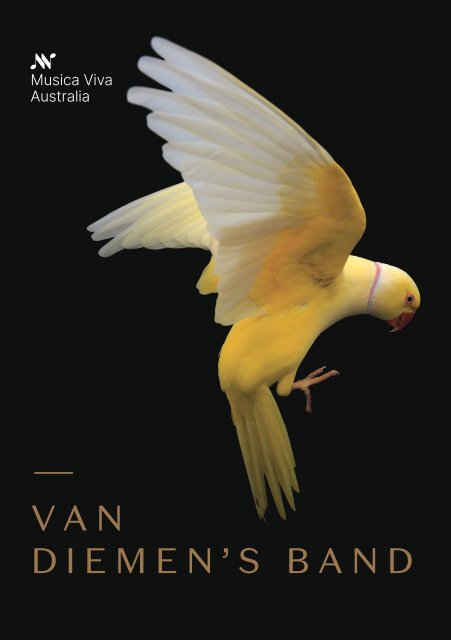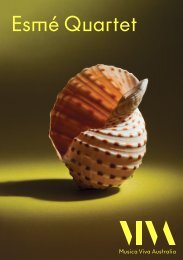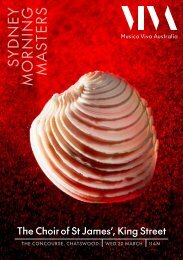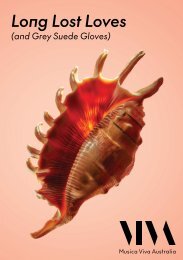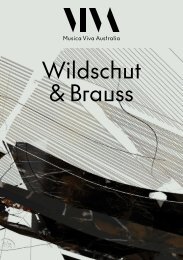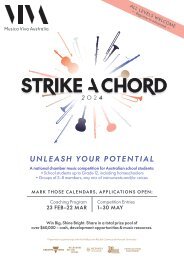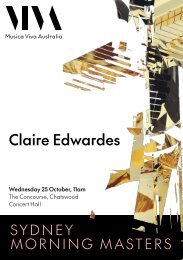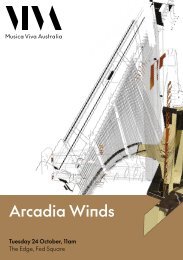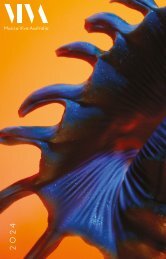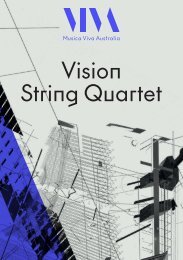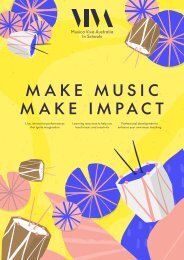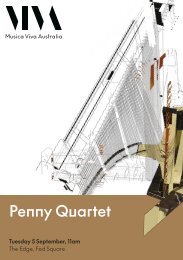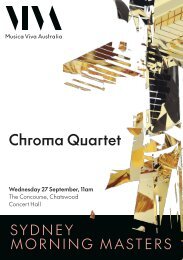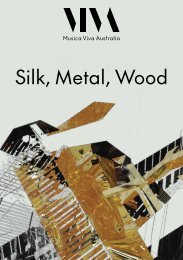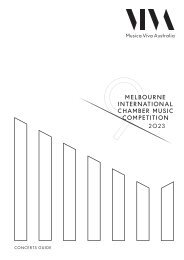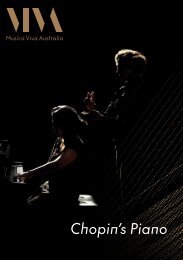Van Diemen's Band Program Guide | April & May 2022
You also want an ePaper? Increase the reach of your titles
YUMPU automatically turns print PDFs into web optimized ePapers that Google loves.
—<br />
VAN<br />
DIEMEN’S BAND
—<br />
Take flight in our boundless new vision.<br />
A Winter’s Journey<br />
Allan Clayton<br />
& Kate Golla<br />
Copyright Gary Heery<br />
Z.E.N. Trio<br />
—<br />
Avi Avital &<br />
Giovanni Sollima<br />
musicaviva.com.au/<strong>2022</strong><br />
Signum<br />
Saxophone Quartet<br />
& Kristian Winther<br />
Find out more:
Musica Viva Australia acknowledges the Traditional Custodians of the many lands on<br />
which we meet, work, and live, and we pay our respects to their Elders past and present –<br />
people who have sung their songs, danced their dances and told their stories<br />
on these lands for thousands of generations, and who continue to do so.<br />
VAN DIEMEN’S BAND<br />
Julia Fredersdorff Artistic Director & violin<br />
Simone Slattery Violin & recorder<br />
Katie Yap Viola<br />
Laura Vaughan Bass viol<br />
Anton Baba Bass viol & cello<br />
Donald Nicolson Harpsichord<br />
A D E L A I D E<br />
Adelaide Town Hall<br />
Thursday 28 <strong>April</strong>, 7.30pm<br />
Recorded for delayed broadcast on ABC Classic<br />
B R I S B A N E<br />
Conservatorium Theatre,<br />
Griffith University, South Bank<br />
Thursday 5 <strong>May</strong>, 7pm<br />
Steven Kinston Tribute Concert<br />
C A N B E R R A<br />
Llewellyn Hall, ANU School of Music<br />
Thursday 12 <strong>May</strong>, 7pm<br />
N E W C A S T L E<br />
Newcastle City Hall<br />
Tuesday 10 <strong>May</strong>, 7.30pm<br />
P E R T H<br />
Perth Concert Hall<br />
Tuesday 26 <strong>April</strong>, 7.30pm<br />
S Y D N E Y<br />
City Recital Hall<br />
Monday 9 <strong>May</strong>, 7pm<br />
Saturday 30 <strong>April</strong>, 2pm<br />
|<br />
1<br />
|<br />
M E L B O U R N E<br />
Elisabeth Murdoch Hall,<br />
Melbourne Recital Centre<br />
Tuesday 3 <strong>May</strong>, 7pm<br />
Saturday 14 <strong>May</strong>, 7pm<br />
Pre-concert talks for this tour will be<br />
made available online. Please see<br />
musicaviva.com.au for details.<br />
With special thanks to Ensemble Patrons Ian Dickson & Reg Holloway for their support of this tour,<br />
and to the Producers’ Circle and Amadeus Society for their support of the <strong>2022</strong> Concert Season.
FROM THE ARTISTIC DIRECTOR<br />
|<br />
2<br />
|<br />
© Keith Saunders<br />
In June last year, reprogramming the <strong>2022</strong><br />
mainstage season as quickly as I had had to<br />
reprogram 2021, I had a stimulating conversation<br />
with Julia Fredersdorff about a potential tour.<br />
We threw ideas around (Julia is as brilliant<br />
a conversationalist as she is a player) and I<br />
followed up with a quick email. ‘Was just listening<br />
to Beethoven’s first piano concerto and thought<br />
that the idea of borders is not simply geographic;<br />
there’s something about composers who occupy<br />
the border between stylistic/epochal change that<br />
remains ever fascinating. I throw that into your<br />
hat!’<br />
It remained there not long. ‘I am a big fan of<br />
“themes” based on words which can have many<br />
different connotations,’ she replied with indecent<br />
speed. ‘This word “border” or “borderlands”<br />
is exactly that. Borders are pertinent in the<br />
COVID era in Australia, and I think we can<br />
also incorporate the idea of music from the<br />
“extremities” (geographically/stylistically/<br />
epochal). The idea of extremity also ties in nicely<br />
with the fact that we (being Tasmanian) are from<br />
an island at the extremity of Australia...’<br />
And so this delicious program was born. Of<br />
course, such borderlands are now loaded<br />
with more geopolitical significance than it is<br />
possible to bear. The duties and responsibilities<br />
of those who live alongside other nations could<br />
not be more potently articulated than they<br />
are at present, nor so wilfully ignored. In all<br />
the composers and works Julia has threaded<br />
together so beautifully in this program, I hope<br />
your thoughts dwell for a moment on the creative<br />
potential of proximity and the enduring soft<br />
diplomacy of exquisite art.<br />
Paul Kildea<br />
Artistic Director<br />
Musica Viva Australia
PROGRAM<br />
‘ BORDERLANDS’<br />
Dietrich BECKER (1623–1679)<br />
Sonata No. 5 in F Major (1674)<br />
7 min<br />
Borderlands Suite (assembled by Julia Fredersdorff)<br />
Samuel SCHEIDT (1587–1654)<br />
Galliard Battaglia (1621)<br />
3 min<br />
Dietrich BECKER (1623–1679)<br />
Paduan<br />
5 min<br />
Jean de SAINTE-COLOMBE (1640–1700)<br />
Les Pleurs<br />
Samuel SCHEIDT (1587–1654)<br />
Courant<br />
Philipp Heinrich ERLEBACH (1657–1714)<br />
Chaconne from Ouverture No. 2 (1693)<br />
Tomaso ALBINONI (1671–1751)<br />
Sonata II in C Major, Op. 2 No. 3 from Sinfonia à 5 (1700)<br />
3 min<br />
2 min<br />
3 min<br />
11 min<br />
|<br />
3<br />
|<br />
INTERVAL<br />
Georg MUFFAT (1653–1704)<br />
Sonata No. 1 in D Major from Armonico Tributo (1682)<br />
María Huld Markan SIGFÚSDÓTTIR (b 1980)<br />
Clockworking (2013)<br />
ANONYMOUS (attr. Biber or Schmelzer)<br />
Sonata Jucunda<br />
Donald NICOLSON (b 1979)<br />
Spirals (<strong>2022</strong>)<br />
World premiere performances<br />
14 min<br />
8 min<br />
7 min<br />
6 min
MEET THE ARTISTS<br />
|<br />
4<br />
|<br />
<strong>Van</strong> Diemen’s <strong>Band</strong><br />
Based in Tasmania, ‘Australia’s Baroque<br />
supergroup’ <strong>Van</strong> Diemen’s <strong>Band</strong> is a<br />
collective of some of the country’s most<br />
highly respected early music specialists,<br />
who between them have worked with<br />
leading ensembles around the world<br />
such as Les Arts Florissants, Les Talens<br />
Lyriques, Ensemble Pygmalion, Il Pomo<br />
d’Oro, Orchestre des Champs-Élysées,<br />
The English Concert, Academy of Ancient<br />
Music, Orchestra of the Eighteenth<br />
Century, Le Parlement de Musique and the<br />
Amsterdam Baroque Orchestra.<br />
Founded in 2016 by violinist Julia<br />
Fredersdorff, <strong>Van</strong> Diemen’s <strong>Band</strong> varies<br />
in size from chamber group to a larger<br />
mid-18th-century orchestra, working<br />
with regular guest directors including the<br />
French Baroque specialist Martin Gester<br />
in exploring the creativity and freedom of<br />
expression in music of the Baroque while<br />
deferring to historical sources on style and<br />
instrumentation.<br />
<strong>Van</strong> Diemen’s <strong>Band</strong>’s 2017 debut album<br />
Cello Napoletano featured soloist<br />
Catherine Jones in the cello concertos<br />
of Nicola Fiorenza and was released<br />
internationally the following year to<br />
critical acclaim. Since then, the group has<br />
appeared in concerts and festivals in its<br />
home state and around mainland Australia,<br />
establishing itself as one of the most<br />
distinguished new groups on the scene.<br />
The group’s recording of Bach Bass<br />
Cantatas with soloist David Greco<br />
appeared on the ABC Classic label in 2020<br />
and its first project for the prestigious<br />
Swedish recording label BIS, the Concerti<br />
grossi Opus 3 by Handel, was released in<br />
<strong>May</strong> 2021, attracting worldwide attention<br />
for its ‘innate musicality ... impeccable<br />
preparation and spontaneity’ (Early Music<br />
Review [UK] 2021).
Melbourne-born violinist Julia<br />
Fredersdorff studied Baroque violin with<br />
Lucinda Moon at the Victorian College<br />
of the Arts, before travelling to the<br />
Netherlands to study with Enrico Gatti at<br />
the Royal Conservatorium in The Hague.<br />
Based in Paris for close to a decade,<br />
Julia freelanced with some of the finest<br />
European ensembles, such as Les Talens<br />
Lyriques, Les Folies Françoises, Le Concert<br />
d’Astrée, Le Parlement de Musique,<br />
Ensemble Matheus, Les Paladins,<br />
Il Complesso Barocco, New Dutch<br />
Academy, Ensemble Aurora and Bach<br />
Concentus.<br />
Now resident again in Australia, Julia is<br />
the founder and Artistic Director of <strong>Van</strong><br />
Diemen’s <strong>Band</strong>. She is also a founding<br />
member of the chamber ensemble<br />
Ironwood and the twice ARIA-nominated<br />
Baroque trio Latitude 37, and founder<br />
and former Artistic Director of the annual<br />
Peninsula Summer Music Festival on the<br />
Mornington Peninsula. Julia has appeared<br />
in major arts festivals around Australia and<br />
New Zealand and has toured extensively<br />
across Europe, from Reykjavík to Wrocław,<br />
Madeira and Venice.<br />
Julia has participated in nearly 40<br />
international recordings for the labels BIS,<br />
Virgin Classics, Deutsche Grammophon,<br />
Accent, Accord, Naïve, Erato, Passacaille,<br />
Ambronay, ABC Classic, Vexations840 and<br />
Tall Poppies.<br />
Australian violinist Simone Slattery<br />
is one of the country’s most versatile<br />
young musicians and performers, with<br />
a passion for music from a wide range<br />
of eras. Her performances nationally<br />
and internationally, on both modern and<br />
Baroque violin, have received critical<br />
acclaim. Simone has appeared as<br />
soloist, recitalist and chamber musician<br />
throughout Australia and overseas, and<br />
performs with ensembles including<br />
L’Arpeggiata, Netherlands Bach Society,<br />
Australian Brandenburg Orchestra,<br />
Melbourne Chamber Orchestra, Orchestra<br />
of the Antipodes, Australian Haydn<br />
Ensemble, Ironwood and the Adelaide<br />
Symphony Orchestra.<br />
Simone began her formal violin studies<br />
at the University of Adelaide Elder<br />
Conservatorium of Music, before moving<br />
to Melbourne to study at the Australian<br />
National Academy of Music. She has also<br />
received training in the USA, Canada and<br />
Europe, and has been a Banff Centre<br />
Creative Resident and Britten-Pears<br />
Emerging Artist. She is the recipient of<br />
awards from the Ian Potter Cultural Trust,<br />
the Thomas Elder Overseas Fund, the<br />
Australian String Quartet and the Elder<br />
Conservatorium of Music. Simone recently<br />
completed PhD studies at the University of<br />
Adelaide, and was a 2019 Churchill Fellow.<br />
Melbourne-based modern and Baroque<br />
violist Katie Yap plays with Australia’s<br />
finest ensembles including the Australian<br />
World Orchestra, Australian Brandenburg<br />
Orchestra and Melbourne Chamber<br />
Orchestra, and has joined groups such as<br />
the Academy of Ancient Music overseas.<br />
She is a founding member of Croissants<br />
& Whiskey, the Chrysalis Harp Trio and<br />
Wattleseed Ensemble.<br />
Katie is fascinated by music’s ability to tell<br />
stories and bring people together. As a<br />
finalist in the 2019 Freedman Fellowship,<br />
she developed a concert called HOME<br />
for Wattleseed Ensemble. Her vision for<br />
that project is to address climate change<br />
in a way that brings people together, by<br />
focusing on the concept of home through<br />
diverse music, spanning 1000 years and<br />
including a commission of a new work by<br />
Melbourne-based composer Matt Laing.<br />
Katie has a particular interest in the<br />
breadth and depth of music outside the<br />
canon, particularly by female composers –<br />
and she is able to share this as the Artistic<br />
Director of the 3MBS festival Music, She<br />
Wrote, a celebration of women in music.<br />
In her spare time, she likes to explore a<br />
|<br />
5<br />
|
|<br />
6<br />
|<br />
wide range of musical contexts, including<br />
folk music and improvising. She has a<br />
notoriously sweet tooth and a penchant for<br />
stress-baking, which sometimes makes for<br />
delicious rehearsal breaks!<br />
Melbourne-based viola da gamba<br />
specialist Laura Vaughan is a dynamic<br />
and well-recognised member of the early<br />
music scene in Australia. Having studied<br />
at Melbourne Conservatorium with Miriam<br />
Morris, and with Wieland Kuijken and<br />
Philippe Pierlot at the Royal Conservatory<br />
of The Hague, she has established an<br />
active performing career encompassing a<br />
wide range of solo and chamber repertoire<br />
across Australasia.<br />
Passionate about the unique sound of<br />
the viol, Laura is committed to bringing<br />
its exquisite repertoire from the 17th and<br />
18th centuries to life. She is also one of<br />
the few exponents of the rare lirone. Laura<br />
records regularly as a soloist and chamber<br />
musician and appears on numerous<br />
CD recordings. She can often be heard<br />
performing with most major Australian<br />
early music groups and is a founding<br />
member of the trio Latitude 37.<br />
Harpsichordist, organist and pianist<br />
Donald Nicolson is a prominent figure in<br />
performance and research of the music of<br />
17th- and 18th-century Europe, and in high<br />
demand as a keyboardist, composer and<br />
arranger. Born in Wellington, New Zealand,<br />
he commenced harpsichord studies with<br />
Douglas Mews at Victoria University, and<br />
subsequently studied with Ton Koopman<br />
at the Royal Conservatory of The Hague.<br />
Since 2011, Donald has been based in<br />
Melbourne maintaining a busy performing<br />
schedule in the early music scene and on<br />
the orchestral platform. A sought-after<br />
continuo player, Donald is co-founder<br />
of Latitude 37 and frequently performs<br />
with Pinchgut Opera and the Sydney and<br />
Melbourne Symphony Orchestras. He<br />
has directed numerous performances<br />
from the harpsichord for the MSO and the<br />
Australian Chamber Orchestra. Donald<br />
is also a key member of Anja & Zlatna,<br />
an ensemble which performs the folk<br />
music of the Balkans and infuses it with<br />
the improvisational practices of the 17th<br />
century.<br />
Donald graduated with a PhD in<br />
Musicology from the University of<br />
Melbourne in 2018, submitting a thesis<br />
that focussed on the relationship between<br />
17th-century French social history and the<br />
keyboard preludes of Louis Couperin. He<br />
teaches historically informed performance<br />
practice at the University of Melbourne.<br />
Born in Australia, Anton Baba studied<br />
Classical cello at the Eastman School of<br />
Music (USA, 2006) after his initial studies<br />
in Perth. He completed postgraduate<br />
studies on the Baroque cello at the Royal<br />
Conservatory of The Hague (2013), where<br />
he simultaneously undertook studies in<br />
viola da gamba.<br />
Anton has worked as a skilled viola da<br />
gamba and Baroque cello player in the<br />
most experienced Baroque ensembles<br />
of Europe including Amsterdam Baroque<br />
Orchestra and Vox Luminis. Since returning<br />
to Australia in 2018, Anton has been<br />
a regular member of Orchestra of the<br />
Antipodes (Pinchgut Opera), Australian<br />
Romantic and Classical Orchestra and<br />
Australian Brandenburg Orchestra.<br />
Anton is also a dedicated educator and a<br />
member of the ACO Foundations team,<br />
providing music lessons and fostering<br />
creative skills for students at St Mary’s<br />
North Public School. When he is not<br />
playing the cello, Anton enjoys knitting and<br />
throwing a frisbee in his local park.
ABOUT THE MUSIC<br />
‘Borders? I have never seen one.<br />
But I have heard they exist in the<br />
minds of some people.’<br />
THOR HEYERDAHL<br />
The world has changed dramatically<br />
in the months between <strong>Van</strong> Diemen’s<br />
<strong>Band</strong>’s devising of this program and<br />
the performance you’re about to hear,<br />
freighting the term ‘borderlands’ with<br />
renewed and disturbing resonance. But<br />
hearing this Baroque music at a time of<br />
present-day geopolitical stress is to have<br />
a kinship with the circumstances of its<br />
composers, many of whom experienced<br />
first hand the tensions of 17th-century<br />
Europe; in particular, within the German<br />
states of the Holy Roman Empire riven by<br />
the Thirty Years War that ended in 1648.<br />
For <strong>Van</strong> Diemen’s <strong>Band</strong> Artistic Director<br />
Julia Fredersdorff, the German music<br />
of this post-war period written by the<br />
generations preceding Johann Sebastian<br />
Bach is an endlessly fertile and innovative<br />
legacy.<br />
The trading city of Hamburg was<br />
completing its fortifications against the<br />
War when composer Dietrich Becker was<br />
born there in 1623. Initially an organist<br />
before switching to violin, his playing<br />
career took him to other states such as<br />
Schleswig-Holstein and Saxony, and as far<br />
afield as Stockholm, before returning to his<br />
home town in 1662, where he ultimately<br />
became a Cantor in the city’s cathedral.<br />
His Musicalische Frühlings-Früchte<br />
(Musical Spring Fruits) was published in<br />
1668 and dedicated to Hamburg’s city<br />
council in gratitude for the granting of a<br />
full-time job after years as a freelancer.<br />
The F major Sonata from this collection<br />
is an example of Becker’s acquaintance<br />
with other national styles beyond the<br />
border, notably the Italianate contrasting<br />
of fast and slow sections, and the French<br />
predilection of the time for writing in five<br />
instrumental parts. (Elsewhere in the<br />
series, he appears to be the first composer<br />
ever to use the sequence of French<br />
dances Allemande-Courante-Sarabande-<br />
Gigue in successive movements, setting a<br />
precedent for J.S. Bach and others.)<br />
Fredersdorff has assembled a<br />
Borderlands Suite from works whose<br />
combined effect suggests to her a<br />
trajectory of emotions stemming from war<br />
and its aftermath. The opening Galliard<br />
Battaglia, with its evocation of opposing<br />
trumpet calls on the field of war, comes<br />
from a three-volume set of instrumental<br />
works by Halle’s court Kapellmeister<br />
Samuel Scheidt in<br />
the 1620s. War and<br />
plague would later<br />
take away Scheidt’s<br />
employment and all<br />
four of his surviving<br />
children, as well as<br />
half of Halle’s entire<br />
population.<br />
Funeral ritual is described by a Paduan (or<br />
pavane) from Becker’s aforementioned<br />
‘Spring Fruits’, while the tears of grief in<br />
Les Pleurs by the still-mysterious French<br />
viol master Jean de Sainte-Colombe from<br />
a vast collection of 67 ‘Concerts’ for viola<br />
da gamba duet were shed to a worldwide<br />
audience in the 1991 film Tous les matins<br />
du monde. A Courant from Scheidt’s<br />
first volume of instrumental Ludi musici<br />
(1621) suggests to Fredersdorff a feeling<br />
of resentment in its spiky, argumentative<br />
running figures; the dance itself requiring<br />
swift footwork. Finally, a 1693 Chaconne<br />
resolves these abject feelings in a tripletime<br />
dance of beneficent healing as was<br />
customary in many an opera and suite of<br />
the time; in this instance, by the German<br />
Philipp Heinrich Erlebach, the longserving<br />
Kapellmeister at the Thuringian<br />
court of Rudolstadt. The post there<br />
|<br />
7<br />
|
|<br />
8<br />
|<br />
consumed both his entire working life,<br />
and then his estate’s complete collection<br />
of music in a fire some 20 years after his<br />
death.<br />
Tomaso Giovanni<br />
Albinoni is truly<br />
an inhabitant<br />
of various<br />
borderlands:<br />
geographically, a<br />
Venetian born in<br />
a city well past its<br />
peak as a powerful<br />
trading centre; and professionally, as a<br />
self-declared dilettante who was spared<br />
the necessity of seeking paid work at<br />
church or court by his prosperous middleclass<br />
family’s finances. Even his early<br />
musical style is something of a bridge<br />
between the five-part string writing of<br />
the previous century (the Opus 2 was<br />
published in 1700) and the more overt<br />
virtuosity of his near-contemporaries<br />
Vivaldi and Locatelli. Albinoni was enough<br />
of a contrapuntist to be admired by the<br />
faraway J.S. Bach, and the technique is<br />
employed in both of the faster movements<br />
of this C major Sonata from the set. But<br />
it’s in the two slow movements with their<br />
ravishing melodies that the fanciful listener<br />
can hear the singing from La Serenissima’s<br />
canals, or at least proof that Albinoni was<br />
above all an opera composer with some 80<br />
stage works to his credit.<br />
The remarkable Georg Muffat’s life and<br />
work represents a traversal of borders<br />
in every sense. Descended from Scots,<br />
born French, part-educated in Paris<br />
(with Lully) and Italy, driven by the threat<br />
of war to Vienna, Prague, Salzburg and<br />
Passau, he ultimately considered himself<br />
a German. His early violin sonata (1677) is<br />
an enharmonic masterpiece, wandering<br />
through the keys like a browser in an opshop.<br />
It was in Italy that Muffat made the<br />
acquaintance of his exact contemporary<br />
Arcangelo Corelli, whose then unpublished<br />
concerti grossi inspired the visitor to try<br />
his hand at the fledgling form with his<br />
Armonico Tributo, published in Salzburg<br />
in 1682; Corelli’s totemic Opus 6 set<br />
would not hit the printing presses until<br />
30 years later. The set displays Muffat’s<br />
cosmopolitan influences in the Lullian<br />
five-part string writing (casually stated as<br />
‘suitable for few or many instruments’) and<br />
the Corellian alternation of tutti and solo<br />
passages – a concerto grosso hallmark.<br />
There are also the forms from either side<br />
of the borderlands, mixing abstract Grave<br />
movements with courtly dances from<br />
France.<br />
Living on the edge<br />
of the Arctic Circle,<br />
Icelandic composer<br />
and violinist María<br />
Huld Markan<br />
Sigfúsdóttir is<br />
best known as a<br />
member of the<br />
indie band amiina,<br />
that has released several albums since<br />
1999. Like her fellow countryman Ólafur<br />
Arnalds, Sigfúsdóttir not only mixes music<br />
genres with impressive commercial<br />
success: she consigns their classifications<br />
to irrelevance. Clockworking (2013) is a<br />
prime example, scored for Baroque string<br />
trio and pre-recorded tape, a deliberate<br />
fusion of the ‘antique’ sound of gut strings<br />
with modern electronics in the slowmotion<br />
incantation of a pre-Industrial<br />
Revolution work song. Singing as an aid<br />
to repetitive manual labour was and is<br />
common as both distraction and impetus<br />
(the device even features in the Spinning<br />
Chorus from Wagner’s opera<br />
The Flying Dutchman), and here the<br />
Baroque instruments play with varied<br />
rhythmic values to suggest the different<br />
sizes of interlocking cogs in a sort of<br />
mechanistic lullaby.<br />
It’s tempting to think there must be<br />
a ‘program’ driving the effects and<br />
derivations of the Sonata Jucunda – the<br />
croaking of frogs, sounds of drones, and<br />
folk-band imitations that presumably give<br />
the work its ‘joking’ title – but impossible
to prove, because the composer is<br />
unknown. It’s been suggested that<br />
Heinrich Ignaz Franz von Biber might<br />
have been responsible by virtue of<br />
the work’s descriptive elements; Biber<br />
also composed a vivid Battalia in 1673,<br />
and the Sonata Jucunda manuscript is<br />
housed in the same present-day Czech<br />
Republic’s Kroměříž collection as the<br />
bulk of Biber’s work. The violin flourishes<br />
that fizz through the score would seem a<br />
typical stroke from a composer who was<br />
deemed by his contemporaries to be the<br />
outstanding virtuoso of the 17th century,<br />
stretching technical demands of the<br />
player to absolute limits as well as those<br />
made upon the instrument itself, resorting<br />
to alternative tunings (scordatura) for<br />
dramatic colours, and even arranging<br />
strings between neck and bridge to<br />
visually depict the Cross in his series of<br />
Rosary Sonatas.<br />
Donald Nicolson’s<br />
Spirals (<strong>2022</strong>),<br />
commissioned by<br />
<strong>Van</strong> Diemen’s <strong>Band</strong><br />
specifically for<br />
this program, is an<br />
attempt to refract<br />
an observation of<br />
the present day<br />
through ancient materials and musical<br />
form. Taking the passacaglia, a repeated<br />
descending bassline that throughout<br />
the 17th and 18th centuries frequently<br />
connoted loss or grief (think of ‘When I am<br />
laid in earth’ at the conclusion of Purcell’s<br />
Dido and Aeneas), Nicolson weaves in the<br />
melody of a Slavonic Orthodox lament, well<br />
known throughout that religion’s Eastern<br />
diaspora: Dusha moya pregreshnaya<br />
(My sinful soul/Why don’t you weep?).<br />
The constant rotation of the passacaglia<br />
symbolises the circularity of human travail,<br />
history repeating. Nicolson points out that<br />
‘this paradoxical progression never finds<br />
resolution, inviting us to lose ourselves for<br />
a minute within itself.’<br />
The events of <strong>2022</strong> have again made<br />
borders the trigger for armed conflict,<br />
and border security the raison d’être and<br />
campaign slogan of governments. Borders<br />
bring both protection and obstruction,<br />
but they also erase much on either side,<br />
creating a place of absence, terra nullius of<br />
the spirit along the ribbon of their physical<br />
space. Not so in this program, where<br />
the ‘borderland’ of geography, history<br />
or imagination is the stepping stone to<br />
adventure and discovery, a longed-for<br />
portal, the place where the ‘other’ can be<br />
met, embraced and shared. These days<br />
we see too many borders. In the minds of<br />
these composers, they didn’t exist.<br />
© CHRISTOPHER LAWRENCE, <strong>2022</strong><br />
|<br />
9<br />
|
Melbourne’s Finest<br />
Afternoon Tea Experience<br />
Discover The Langham Afternoon Tea at Aria Bar & Lounge and<br />
indulge in a selection of British tea time classics with a modern twist.<br />
#LovingLangham #CelebrateTheEveryday<br />
1 Southgate Avenue, Southbank, Vic 3006 Australia<br />
T (61) 8696 8888 F (61) 9690 5889<br />
langhamhotels.com/melbourne
Paul Grabowsky<br />
& Andrea Lam<br />
National Tour: 11–25 June<br />
musicaviva.com.au/grabowsky-lam<br />
1800 688 482<br />
—<br />
Pianist Andrea Lam performs Bach’s miraculous<br />
Goldberg Variations, before Paul Grabowsky plays his<br />
own jazz-inflected interpretation of this eternal theme.
INTERVIEW<br />
BY STEPHANIE ESLAKE<br />
|<br />
12<br />
|<br />
For an artist of the 17th century, Georg<br />
Muffat certainly got around. The Baroque<br />
composer of Scottish descent was born in<br />
Savoy, lived in Vienna, travelled to Prague,<br />
and studied in Rome. He crafted German<br />
suites in a French style, and concerti grossi<br />
in an Italian style.<br />
What might borders have meant to this<br />
composer who crossed them in the name<br />
of music?<br />
Baroque violinist Julia Fredersdorff<br />
considers Muffat a “true musical polyglot”.<br />
The composer was at the forefront of her<br />
mind when she sat down with Musica<br />
Viva Australia Artistic Director Paul<br />
Kildea. Together, they imagined a concert<br />
program that could go on tour – music<br />
they could share across Australia’s own<br />
state borders, which for so long had been<br />
locked.<br />
“Paul and I realised this idea of borders<br />
had suddenly become much more of a<br />
talking point, and that exploring the idea<br />
of borders or lack thereof – in a musical<br />
sense, a compositional sense, as well as<br />
a human sense – made for very fertile<br />
ground,” Julia says.<br />
Borderlands came to life: together, Musica<br />
Viva Australia and <strong>Van</strong> Diemen’s <strong>Band</strong><br />
would reconnect Australia through live<br />
performance.<br />
Julia founded <strong>Van</strong> Diemen’s <strong>Band</strong> in<br />
Tasmania. Though her home state has no<br />
land borders, the violinist has also spent<br />
time in Europe. She would travel from<br />
France to the Netherlands for lessons with<br />
an Italian teacher, experiencing a continent<br />
with “so many radically different cultures<br />
jammed in right next to each other”.<br />
So when the pandemic prevented her from<br />
travelling across the states of Australia, it<br />
felt like a “shock to the system”.<br />
“The pandemic certainly did highlight<br />
the feeling of geographical division –<br />
something we weren’t used to here.”<br />
We can contemplate division and<br />
togetherness through this program. While<br />
Muffat was an “obvious choice” to include,<br />
other composers – such as Becker, Sainte-<br />
Colombe and Albinoni – reflect the theme<br />
philosophically.<br />
“The 17th century was a time of great<br />
instability in Europe. The geopolitical<br />
situation would have had a huge impact<br />
on the way composers worked, and the<br />
context in which their music was written,”<br />
Julia explains.<br />
“Each of the composers in this program<br />
comes from the extremity of a country – or<br />
a port town or land border, or a land which<br />
was particularly isolated from the rest of<br />
the world.”<br />
Some even “push the extremities of<br />
their own art form”. María Huld Markan<br />
Sigfúsdóttir crosses genre and era in her<br />
2013 piece Clockworking. Baroque strings<br />
are set to electronic backing, creating a<br />
soundscape “as isolated as the geography<br />
of her home country of Iceland”.<br />
It’s impossible to overlook the impact<br />
of conflict on the evolution of borders.<br />
Much of this program traces war and its
© Albert Comper<br />
aftermath; moments that have challenged<br />
or strengthened relationships between<br />
countries and cultures.<br />
Julia feels major events, such as war<br />
and the pandemic, “amplify the need for<br />
music”.<br />
“This is a salient reminder that music –<br />
especially right now – is the ultimate tool<br />
for survival. It gives us a reason to keep<br />
going, and it reminds us of our common<br />
humanity.”<br />
For this program, harpsichordist Donald<br />
Nicolson composed a new work, Spirals.<br />
In light of events in Ukraine, Donald made<br />
a “last-minute change” to the piece,<br />
weaving an Orthodox prayer into the<br />
structure of his composition.<br />
In the composer’s words, it’s an update<br />
that “acknowledges the conflicts that we<br />
are living through or reading about right<br />
now”.<br />
“The concept of Borderlands has suddenly<br />
become pertinent as we scroll through our<br />
newsfeeds,” Donald says.<br />
Spirals also embeds a musical connection<br />
to the theme: Donald was inspired by<br />
the passacaglia, a musical form used in<br />
European cultures in the 17th and 18th<br />
centuries.<br />
“I visualised that bassline as maintaining<br />
an ever-presence in our musical<br />
consciousness.<br />
“Whether now, or 400 years ago – here<br />
in the Southern Hemisphere, or in the<br />
countrysides of the European boundaries<br />
– the passacaglia has always existed, and<br />
continues to exist beyond us.<br />
“Spirals allows us to step away from our<br />
immediate surroundings – to pause, to<br />
think, to allow our mind to wander, or not;<br />
to contemplate or be transported.”<br />
Ahead of its world premiere, Donald<br />
recalls how Julia was “clear from the<br />
outset” that she wanted original Australian<br />
music on this global program. The pair<br />
have a history of collaboration; Donald is<br />
also a harpsichordist and organist who<br />
has crafted other arrangements for <strong>Van</strong><br />
Diemen’s <strong>Band</strong>.<br />
In exploring music of the Baroque era, as<br />
well as the remarkable characteristics of<br />
its instruments, Donald feels <strong>Van</strong> Diemen’s<br />
<strong>Band</strong> is “creating a whole new legacy of<br />
original music and sounds”.<br />
“True to the concept, these are the new<br />
borderlands of the early music movement.<br />
And Julia’s assembly of artists presents us<br />
with a unique opportunity to hear these<br />
musicians performing on the same stage.”<br />
As for crossing local borders on their<br />
Musica Viva Australia tour, Julia feels<br />
“a sense of hope and joy”.<br />
“This is something a little Tassie band<br />
could never have taken the risk on without<br />
the support of Musica Viva Australia, and<br />
we are so grateful for this opportunity to<br />
spread our wings after a long period on the<br />
ground!”<br />
—<br />
<strong>2022</strong><br />
|<br />
13<br />
|
2
PATRONS<br />
CUSTODIANS<br />
ACT Geoffrey & Margaret Brennan, Clive & Lynlea<br />
Rodger, Ruth Weaver, Anonymous (4)<br />
NSW Jennifer Bott AO, Catherine Brown-Watt PSM<br />
& Derek Watt, Lloyd & Mary Jo Capps AM, Andrew<br />
& Felicity Corkill, Peter Cudlipp, Liz Gee, Suzanne<br />
Gleeson, David & Christine Hartgill, Annie Hawker,<br />
Elaine Lindsay, Trevor Noffke, Dr David Schwartz, Ruth<br />
Spence-Stone, Mary Vallentine AO, Deirdre Nagle<br />
Whitford, Richard Wilkins, Kim Williams AM, Megan &<br />
Bill Williamson, Ray Wilson OAM, Anonymous (12)<br />
QLD Anonymous (2)<br />
SA Monica Hanusiak-Klavins & Martin Klavins,<br />
Anonymous (5)<br />
TAS<br />
Kim Paterson QC, Anonymous<br />
VIC Elizabeth & Anthony Brookes, Julian Burnside<br />
AO QC, Ms Helen Dick, Robert Gibbs & Tony Wildman,<br />
Helen Vorrath, Anonymous (8)<br />
WA Graham Lovelock, Anonymous (4)<br />
LEGACY DONORS<br />
NSW The late Charles Berg, The late Janette Hamilton,<br />
The late Dr. Ralph Hockin in memory of Mabel Hockin,<br />
The late Beryl Raymer, The late Kenneth W Tribe AC,<br />
QLD The late Steven Kinston, Anonymous<br />
SA<br />
The late Edith Dubsky, The late John Lane Koch<br />
VIC The late Raymond Brooks, In memory of Anita<br />
Morawetz, The family of the late Paul Morawetz,<br />
The late Dr G D Watson<br />
ENSEMBLE PATRONS<br />
Our artistic vision for <strong>2022</strong> is made possible thanks to the<br />
extraordinary generosity of our Ensemble Patrons, each<br />
of whom supports the presentation of an entire national<br />
tour for our <strong>2022</strong> Season.<br />
Ian Dickson & Reg Holloway (<strong>Van</strong> Diemen’s <strong>Band</strong>)<br />
Anonymous (Paul Grabowsky & Andrea Lam)<br />
Peter Griffin AM & Terry Swann as part of<br />
The Travellers - Giving Circle (A Winter’s Journey)<br />
Australian Music Foundation (Z.E.N. Trio)<br />
Eleanore Goodridge OAM (Avi Avital & Giovanni Sollima)<br />
CONCERT CHAMPIONS<br />
Adelaide Joan & Ivan Blanchard, Helen Fulcher, Helen<br />
Bennetts & Tim Lloyd, The late Lesley Lynn, Dr Susan<br />
Marsden & Michael Szwarcbord, Leonie Schmidt &<br />
Michael Davis, Anonymous (2)<br />
Brisbane Ian & Cass George, Andrew & Kate Lister,<br />
Barry & Diana Moore, The Hon Justice A Philippides,<br />
Anonymous<br />
Canberra ACT Committee and Ruth Weaver, Andrew<br />
Blanckensee Music Lover, Humphries Family Trust,<br />
Malcolm Gillies and David Pear, Dr Sue Packer, Sue<br />
Terry & Len Whyte, Anonymous<br />
Melbourne Alexandra Clemens, Continuo Syndicate,<br />
Peter Griffin AM & Terry Swann, Monica Lim & Konfir<br />
Kabo, Peter Lovell, Rosemary & John MacLeod, The<br />
Morawetz Family in memory of Paul Morawetz, Greg<br />
Shalit & Miriam Faine (2), Dr Michael Troy, The Musica<br />
Viva Victorian Committee<br />
Newcastle Megan & Bill Williamson, Newcastle<br />
Committee<br />
Perth Deborah Lehmann AO & Michael Alpers AO,<br />
In memory of Stephanie Quinlan (2),<br />
Valerie & Michael Wishart<br />
Sydney Patricia Crummer, Pam Cudlipp, Dr Jennifer<br />
Donald & Mr Stephen Burford, Charles Graham – in<br />
acknowledgement of his piano teacher, Sana Chia,<br />
Katherine & Reg Grinberg, Anthony Strachan, Kay<br />
Vernon, Kim Williams AM & Catherine Dovey (2), Ray<br />
Wilson OAM<br />
PRODUCERS’ CIRCLE<br />
Darin Cooper Foundation, Stephen & Michele Johns<br />
AMADEUS SOCIETY<br />
Tony Berg AM & Carol Berg, Marc Besen AC & Eva<br />
Besen AO dec., Ms Jan Bowen AM, Tom Breen &<br />
Rachael Kohn AO, Dr Di Bresciani OAM, Julian Burnside<br />
AO QC (President, Melbourne) & Kate Durham, David<br />
Constable AM & Dr Ida Lichter, Dr Helen Ferguson, Ms<br />
Annabella Fletcher, Dr Annette Gero, Peter Griffin AM<br />
& Terry Swann, Katherine & Reg Grinberg, Jennifer<br />
Hershon & Russell Black, Penelope Hughes, Dr Alastair<br />
Jackson AM, Michael & Frederique Katz, Ruth Magid<br />
(Chair, Sydney) & Bob Magid OAM, Prof. John Rickard,<br />
Andrew Rosenberg, Ray Wilson OAM<br />
|<br />
15<br />
|
|<br />
16<br />
|<br />
MASTERCLASSES<br />
GIVING CIRCLE<br />
The Masterclasses Giving Circle is a group of generous<br />
donors whose collective support will enable the artistic<br />
development of the next generation of Australian<br />
chamber musicians.<br />
Nicholas Callinan AO & Elizabeth Callinan, Caroline &<br />
Robert Clemente, Ian & Caroline Frazer, Allan Myers<br />
AC QC & Maria Myers AC, Patricia H. Reid Endowment<br />
Fund, Andrew Sisson AO & Tracey Sisson, Mick and<br />
Margaret Toller, Anonymous (2)<br />
COMMISSIONS<br />
Musica Viva acknowledges and celebrates those<br />
individuals and collectives who have generously<br />
committed to commissioning new music in 2021/22<br />
to be enjoyed by us all.<br />
In loving memory of Jennifer Bates; Julian Burnside<br />
AO QC & Kate Durham; The Barry Jones Birthday<br />
Commission; Michael & Frederique Katz, in honour of<br />
Cecily Katz; Graham Lovelock & Steve Singer; DR & KM<br />
Magarey; Vicki Olsson; Tribe family in honour of Doug<br />
Tribe’s 75th birthday<br />
Musica Viva also thanks the Silo Collective, the Ken Tribe<br />
Fund for Australian Composition, and the Hildegard<br />
Project for their support in bringing new Australian works<br />
to life.<br />
B A R R Y J O N E S<br />
BIRTHDAY COMMISSION<br />
$500+<br />
Steve Bracks AC & Terry Bracks AM, Dr George<br />
Deutsch OAM & Kathy Deutsch, Carrillo Gantner<br />
AC & ZiYin Gantner, Professor Margaret Gardner<br />
AC & Professor Glyn Davis AC, Naomi & George<br />
Golvan QC, Hon David Harper AM, Ellen Koshland<br />
& James McCaughey, Miles Lewis, Barry McGaw,<br />
Jeannette McHugh, Fiona McLeod AO SC, Peter &<br />
Ruth McMullin, Julie & Ian Macphee, peckvonhartel<br />
architects, Anne & Robert Richter QC, Gianna Rosica,<br />
Joy Selby Smith, Maureen & Tony Wheeler, Lyn<br />
Williams, Dr Robyn Williams AO, Bob, Robyn, Annie &<br />
Nick, Anonymous (3)<br />
We thank all our audience members<br />
who donated the value of their<br />
cancelled tickets towards the Artist<br />
Fund and sincerely appreciate the<br />
generous support we receive from<br />
our incredible community.<br />
We encourage you to scan the QR<br />
code to see a full list of donors over<br />
$500 to Musica Viva Australia.<br />
MAJOR GIFTS<br />
$100,000+<br />
NSW The Berg Family Foundation,<br />
Patricia H. Reid Endowment Fund<br />
$50,000–$99,999<br />
ACT Marion & Michael Newman<br />
NSW J A Donald Family, Katherine Grinberg,<br />
Tom & Elisabeth Karplus<br />
$20,000–$49,999<br />
NSW Tom Breen & Rachael Kohn AO, Ian Dickson<br />
& Reg Holloway, Michael & Frederique Katz,<br />
Vicki Olsson<br />
QLD Ian & Caroline Frazer, Andrea & Malcolm Hall-<br />
Brown, The Hon Justice A Philippides<br />
VIC The Morawetz Family in memory of Paul<br />
Morawetz, Marjorie Nicholas OAM, Anonymous<br />
WA<br />
Anonymous<br />
$10,000–$19,999<br />
ACT R & V Hillman, Anonymous<br />
NSW Anne & Terrey Arcus AM, Gardos Family,<br />
Hilmer Family Endowment, Nigel & Carol Price,<br />
Anthony Strachan<br />
QLD Anonymous<br />
SA<br />
Anonymous<br />
VIC Roger Druce & Jane Bentley, Mercer Family<br />
Foundation, Greg Shalit & Miriam Faine, Anonymous<br />
WA<br />
Team Legacy<br />
$5,000–$9,999<br />
ACT Goodwin Crace Concertgoers, Craig Reynolds,<br />
Sue Terry & Len Whyte<br />
NSW Jo & Barry Daffron, Liz Gee, Iphygenia<br />
Kallinikos, DR & KM Magarey, Hywel Sims, David &<br />
Carole Singer, Diane Sturrock, Kim Williams AM &<br />
Catherine Dovey<br />
QLD Andrew & Kate Lister<br />
SA Aldridge Family Endowment, Jennifer & John<br />
Henshall, Galina Podgoretsky in memory of Rodney<br />
Crewther, Anonymous<br />
VIC In memory of Kate Boyce, Dr Di Bresciani OAM<br />
& Lino Bresciani, Alastair & Sue Campbell, Alexandra<br />
Clemens, Robert Gibbs & Tony Wildman, Andrew<br />
Johnston, Stephen Shanasy, Anonymous<br />
WA Deborah Lehmann AO & Michael Alpers AO,<br />
Anonymous
ANNUAL GIVING<br />
$2,500–$4,999<br />
ACT Kristin van Brunschot & John Holliday,<br />
Dr Andrew Singer, Ruth Weaver, Anonymous<br />
NSW ADFAS Newcastle, Sarah & Tony Falzarano,<br />
Mrs W G Keighley, Andrew Rosenberg, Jo Strutt<br />
SA DJ & EM Bleby, Peter Clifton, Ms Judy Potter<br />
& Dr George Potter, STARS<br />
VIC Jan Begg, Anne Frankenberg & Adrian<br />
McEniery, Lyndsey & Peter Hawkins, Doug Hooley,<br />
Ralph & Ruth Renard, Maria Sola, Gai & David Taylor,<br />
Helen Vorrath, Lyn Williams<br />
WA David Cooke, Mrs Morrell, Vivienne Stewart,<br />
Anonymous<br />
$1,000–$2,499<br />
ACT The Breen/Dullo Family, Dudley & Helen<br />
Creagh, Martin Dolan, Olivia Gesini, Malcolm Gillies<br />
AM, Kingsley Herbert, Margaret & Peter Janssens,<br />
Garth Mansfield, Teresa Neeman, Margaret Oates,<br />
S Packer, Clive & Lynlea Rodger, Hannah Semler,<br />
Anonymous (2)<br />
NSW Judith Allen, David & Rae Allen, Maia<br />
Ambegaokar & Joshua Bishop, Dr Warwick Anderson,<br />
Stephen Booth, Catherine Brown-Watt PSM, Neil<br />
Burns, Hon J C Campbell QC & Mrs Campbell, Lloyd<br />
& Mary Jo Capps AM, Stefan Couani, Robin & Wendy<br />
Cumming, Thomas Dent, Nancy Fox AM & Bruce<br />
Arnold, John & Irene Garran, Charles & Wallis Graham,<br />
H2 Cairns Foundation, Annie Hawker, Margaret<br />
Hicks, Lybus Hillman, Dr Ailsa Hocking & Dr Bernard<br />
Williams, Dorothy Hoddinott AO, Catharine & Robert<br />
Kench, Kevin & Deidre McCann, Arthur & Elfreda<br />
Marshall, Dr Dennis Mather & John Studdert, Michael<br />
& Janet Neustein, Paul O’Donnell, In memory of<br />
Katherine Robertson, Dr Robyn Smiles, Geoff Stearn,<br />
Richard & Beverley Taperell, Graham & Judy Tribe,<br />
Mary Vallentine AO, Dr Elizabeth Watson, John & Flora<br />
Weickhardt, Richard Wilkins, Megan & Bill Williamson,<br />
Anonymous (4)<br />
QLD George Booker & Denise Bond, Jill Boughen,<br />
Prof. Paul & Ann Crook, John & Denise Elkins, Robin<br />
Harvey, Lynn & John Kelly, Dr Helen Kerr and Dr John<br />
Ratcliffe, Jocelyn Luck, Barry & Diana Moore, Debra<br />
& Patrick Mullins, Barbara Williams & Jankees van der<br />
Have<br />
SA The late Peter Bailie & Ann-Maree O’Connor,<br />
Ivan & Joan Blanchard, Richard Blomfield, Max & Ionie<br />
Brennan, John & Libby Clapp, Dr Iwan Jensen, The<br />
Hon. Christopher Legoe AO QC & Mrs Jenny Legoe,<br />
Fiona MacLachlan OAM, Dr Leo Mahar, Ann & David<br />
Matison, Diane Myers, H & I Pollard, Trish & Richard<br />
Ryan AO, Anne Sutcliffe, Anonymous (2)<br />
VIC Joanna Baevski, Russ & Jacqui Bate, Peter<br />
Burch AM BM, Alison & John Cameron, Mrs Maggie<br />
Cash, Alex & Elizabeth Chernov, Lord Ebury, Virginia<br />
Henry, Dr Anthea Hyslop, Helen Imber, John V<br />
Kaufman QC, Angela & Richard Kirsner, Ann Lahore,<br />
Janet McDonald, Ruth McNair AM & Rhonda Brown<br />
in memory of Patricia Begg & David McNair, June<br />
K Marks, Mr Baillieu Myer AC, Sir Gustav Nossal,<br />
Barry Robbins, Murray Sandland, Darren Taylor &<br />
Kent Stringer, Wendy R. Taylor, Mark & Anna Yates,<br />
Anonymous<br />
WA David & Minnette Ambrose, Michael & Wendy<br />
Davis, In memory of Raymond Dudley, Helen Dwyer,<br />
Dr Penny Herbert in memory of Dunstan Herbert,<br />
Ms Helen Hollingshead & Mr John Hollingshead,<br />
Anne Last & Steve Scudamore, Zoe Lenard & Hamish<br />
Milne, Mandy Loton OAM, Marian Magee & David<br />
Castillo, John Overton, Elizabeth Syme, Robyn Tamke,<br />
Anonymous (4)<br />
$500–$999<br />
ACT Geoffrey & Margaret Brennan, A & P Chalmers,<br />
Christopher Clarke, Christina Cook, Peter Cumines,<br />
Lesley Fisk, Robert Hefner, Mary Elspeth Humphries,<br />
Claudia Hyles OAM, Margaret Lovell & Grant Webeck,<br />
Dr Louise Moran, Robert Orr, Helen Rankin, Dr Jenny<br />
Stewart, Dr Douglas Sturkey CVO AM, Joan ten<br />
Brummelaar, Dr Paul & Dr Lel Whitbread, Anonymous<br />
NSW Jock Baird in memoriam Annette McClure,<br />
Barbara Brady, Denise Braggett, Vicki Brooke,<br />
Alexandra Bune AM, Robert Cahill & Anne Cahill OAM,<br />
Lucia Cascone, Michael & Colleen Chesterman, Zoë<br />
Cobden-Jewitt & Peter Jewitt, Rhonwen Cuningham,<br />
Trish & John Curotta, Professor Zoltan Endre, Dr<br />
Arno Enno & Dr Anna Enno, Bronwyn Evans, Kate<br />
Girdwood, Anthony Gregg, Rohan Haslam, Megan<br />
Jones, In honour of Michael Katz, Cynthia Kaye,<br />
Mathilde Kearny-Kibble, KP Kemp, Bruce Lane, Olive<br />
Lawson, Trish Ludgate, Dr Colin MacArthur, Laura<br />
McDonald, Dr V Jean McPherson, Alan & Rosemary<br />
Moore, Margot Morgan, Donald Nairn, Professors<br />
Robin & Tina Offler, Kim & Margie Ostinga, Dr John<br />
Rogers, Penny Rogers, Professor Lyndall Ryan AM, Dr<br />
Lynette Schaverien, Anonymous (14)<br />
QLD Janet Franklin, Prof Robert G Gilbert, Marie<br />
Isackson, M F Lejeune, Timothy Matthies & Chris<br />
Bonnily, Anthony Simmonds, Jianxin Zhao & Faye Liu,<br />
Anonymous (4)<br />
SA Lesley Haas-Baker, Terence & Caroline Donald,<br />
Daniel & Susan Hains, Elizabeth Ho OAM, in honour of<br />
the late Tom Steel, Helga Linnert & Douglas Ransom,<br />
Joan Lyons, Ruth Marshall & Tim Muecke, Linda<br />
Sampson, Anonymous (5)<br />
VIC David Bernshaw & Caroline Isakow, Helen<br />
Brack, Pam Caldwell, Elise Callander, Ted & Alison<br />
Davies, Beverley Douglas, Professor Denise Grocke<br />
AO, Alan Gunther, Irene Kearsey & Michael Ridley,<br />
Jane Lazarevic, Monica Lim & Konfir Kabo, Greg J<br />
Reinhardt AM, Eda Ritchie AM, Dr Charles Su & Dr<br />
Emily Lo, Pera Wells, Anonymous (7)<br />
WA Fiona Campbell, Joan Carney, Fred & Angela<br />
Chaney, Jennifer L Jones, Paula Nathan AO & Yvonne<br />
Patterson, Lindsay & Suzanne Silbert, Ruth Stratton,<br />
Christopher Tyler, Peter & Cathy Wiese, Anonymous (2)<br />
|<br />
17<br />
|
CONCERT PARTNERS<br />
Perth Concert Series<br />
Sydney Morning Masters Series<br />
Law Firm<br />
Chartered Accountants<br />
Piano & Tuning<br />
Media<br />
|<br />
18<br />
|<br />
Wines<br />
Hotels<br />
National Government<br />
Musica Viva Australia is a not-for-profit organisation endorsed<br />
by the Australian Taxation Office as a Deductible Gift Recipient<br />
and registered with the Australian Charities and Not-for-profits<br />
Commission (ACNC).
Journey into the Chamber of Musical Curiosities<br />
Hosted by Artistic Director Paul Kildea, the Chamber of<br />
Musical Curiosities is a podcast exploring the world of music<br />
in and around Musica Viva Australia. During the episodes,<br />
guests reflect upon creativity, their careers, and their passion<br />
for chamber music.<br />
Episode 15: Paul Grabowsky<br />
In this episode, Paul Grabowsky sits down to talk about his<br />
upbringing, his life through music and how that journey has<br />
left him coming full circle to his current musical project.<br />
Listen on Spotify, Apple Podcasts or our website<br />
to come with us inside the Chamber of Musical<br />
Curiosities and explore a collection of musical<br />
marvels.<br />
musicaviva.com.au/podcast<br />
A WINTER’S<br />
JOURNEY<br />
ALLAN CLAYTON & KATE GOLLA<br />
National Tour: 12–27 July | Barbican, London: 12 December<br />
musicaviva.com.au/a-winters-journey | 1800 688 482 | barbican.org.uk/whats-on<br />
—<br />
Tenor Allan Clayton and pianist Kate Golla perform Schubert’s immortal songs of love<br />
and loss, newly reinterpreted for Australia through Lindy Hume’s direction<br />
and Fred Williams’ wondrous landscape paintings.<br />
This tour is generously supported by Peter Griffin AM & Terry Swann.<br />
Copyright Gary Heery
TRIBUTE<br />
Steven Kinston (1908–1996)<br />
The concert in Brisbane on 5 <strong>May</strong> is presented in memory of Dr Steven Kinston.<br />
|<br />
20<br />
|<br />
A dental practitioner and a fine pianist,<br />
Dr Steven Kinston was one of a number of<br />
European immigrants whose contribution<br />
to Australia’s artistic life in the 1950s and<br />
1960s helped transform the soul and face<br />
of the nation.<br />
When he and his younger brother, Paul,<br />
arrived in Brisbane in 1938 as Jewish<br />
refugees, they found a place where the<br />
arts were struggling to gain a foothold<br />
in a relatively new nation. Over the<br />
next decade, Dr Kinston contributed<br />
substantially to the development of<br />
Brisbane’s artistic life, founding the<br />
Brisbane branch of Musica Viva Australia.<br />
Born in 1908 in the small town of Kolomea,<br />
Romania, Steven Kinston grew up in<br />
Czernowicz (Cernăutį), where anti-<br />
Semitism and discrimination marred his<br />
childhood. Although possessing high<br />
intelligence and musical ability, he was<br />
barred entrance to any local university. He<br />
travelled to Italy, where anti-Jewish feeling<br />
was less pronounced, and was welcomed<br />
into both the University of Florence and,<br />
simultaneously, that city’s Luigi Cherubini<br />
Conservatorium of Music. In 1933 he<br />
graduated with an unprecedented<br />
two degrees: one in medicine, with a<br />
speciality in dentistry, and another from<br />
the Conservatorium, where he also won a<br />
national piano competition.<br />
At this time it became obvious to<br />
Dr Kinston that his family needed to<br />
find a new life and a new country if they<br />
were to survive Mussolini’s alliance with<br />
Hitler. He was granted refugee status by<br />
Australia, and before emigrating, returned<br />
to Romania to say farewell to his parents.<br />
The Romanian government immediately<br />
conscripted Dr Kinston into the army and<br />
prevented his leaving the country. Only<br />
a series of undercover arrangements<br />
allowed him and his brother to cross the<br />
border to freedom.<br />
After his arrival in Brisbane he auditioned<br />
for the ABC and was accepted on its<br />
roster of soloists. He also established a<br />
successful dental practice.<br />
When business and personal commitments<br />
necessitated the family’s move to Sydney<br />
many years later, Dr Kinston remained a<br />
passionate supporter of Musica Viva and<br />
of the arts in general. His achievements<br />
were made possible through the support<br />
and encouragement of his wife, Lena.<br />
Throughout their 53 years together, he<br />
was intensely devoted to her and to their<br />
two children.<br />
His lifetime commitment to his adopted<br />
country was epitomised by one of his<br />
favourite sayings: ‘The soul of a country is<br />
expressed in its art.’<br />
DAVID COLVILLE
Music brings us together<br />
At Musica Viva Australia we are proud to share<br />
exceptional music with audiences of every age, location<br />
and circumstance — it’s what we have always done,<br />
and what we will always strive to do.<br />
With your contribution, we can support our professional<br />
musicians, introduce children to live music in schools,<br />
commission new works, create innovative and engaging<br />
online content, and develop future generations of artists.<br />
Scan the QR code to give today.<br />
Contact us on philanthropy@musicaviva.com.au


